Reflective Learning Essay: Orientation for Success in Education 2021
VerifiedAdded on 2023/06/18
|8
|2380
|254
Essay
AI Summary
This essay reflects on the importance of reflective learning within the business and management discipline, particularly in the context of higher education. It discusses the impacts of COVID-19 on the hospitality, travel, and leisure industries, utilizing Gibbs' Model of reflection to analyze the situation. The essay also describes the use of formative feedback to inform and improve summative assessed work, highlighting its role in student development. Furthermore, it identifies the cultural and behavioral expectations for students pursuing a degree in business and management, emphasizing effective communication, decision-making, and planning skills. Finally, the essay explains the importance of peer-to-peer support and teamwork in enhancing the learning experience, concluding that reflective learning, feedback mechanisms, and collaborative support are crucial for effective and efficient student learning.
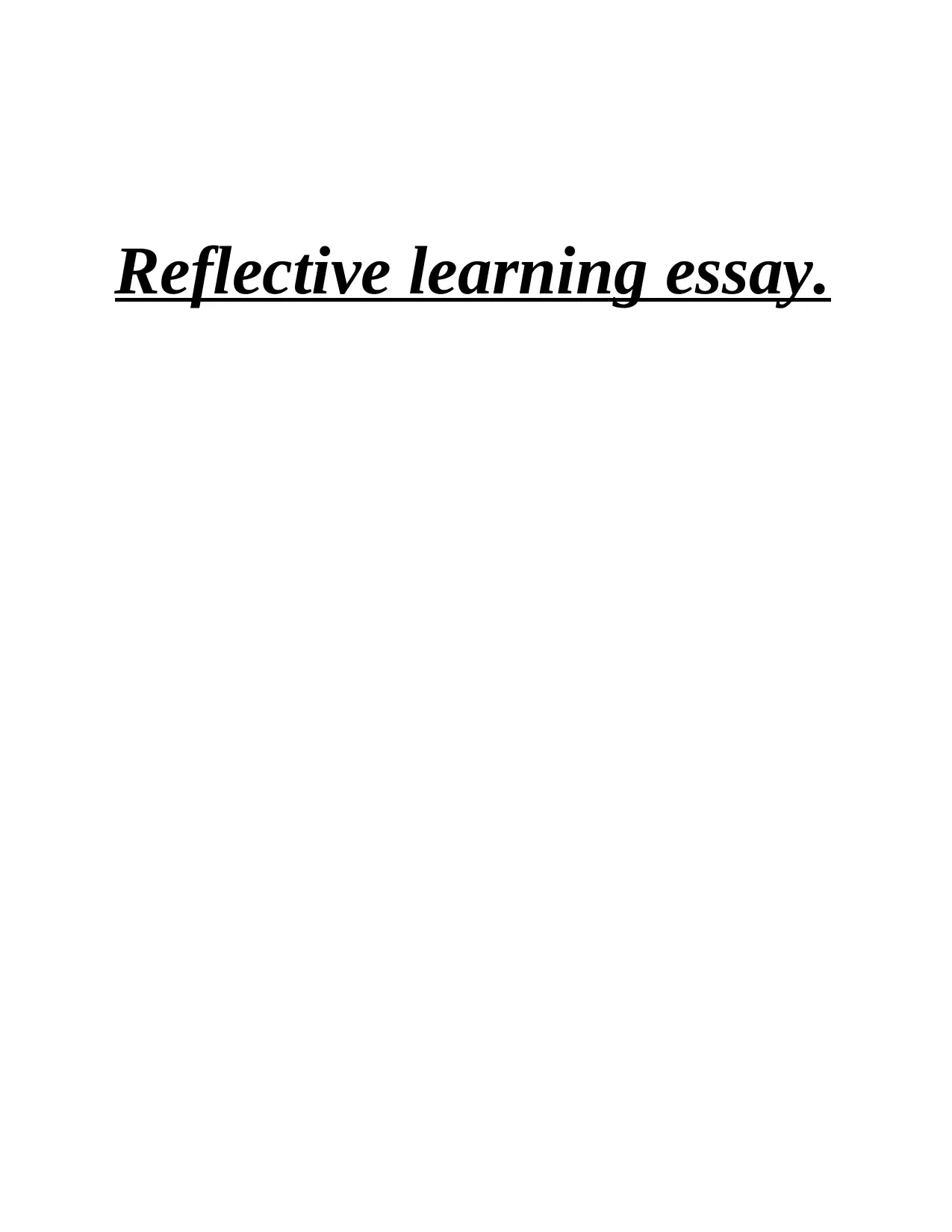
Reflective learning essay.
Paraphrase This Document
Need a fresh take? Get an instant paraphrase of this document with our AI Paraphraser
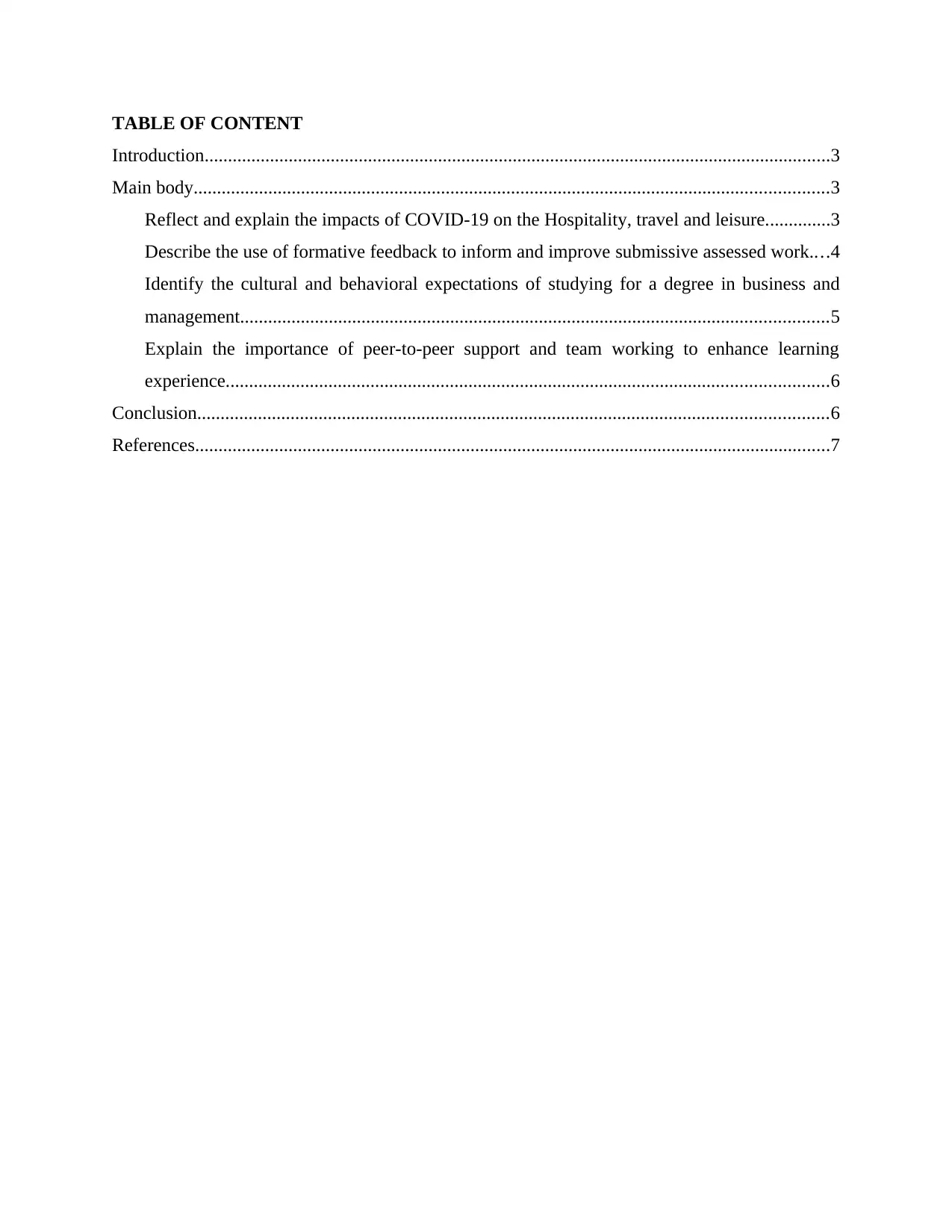
TABLE OF CONTENT
Introduction......................................................................................................................................3
Main body........................................................................................................................................3
Reflect and explain the impacts of COVID-19 on the Hospitality, travel and leisure..............3
Describe the use of formative feedback to inform and improve submissive assessed work....4
Identify the cultural and behavioral expectations of studying for a degree in business and
management..............................................................................................................................5
Explain the importance of peer-to-peer support and team working to enhance learning
experience.................................................................................................................................6
Conclusion.......................................................................................................................................6
References........................................................................................................................................7
Introduction......................................................................................................................................3
Main body........................................................................................................................................3
Reflect and explain the impacts of COVID-19 on the Hospitality, travel and leisure..............3
Describe the use of formative feedback to inform and improve submissive assessed work....4
Identify the cultural and behavioral expectations of studying for a degree in business and
management..............................................................................................................................5
Explain the importance of peer-to-peer support and team working to enhance learning
experience.................................................................................................................................6
Conclusion.......................................................................................................................................6
References........................................................................................................................................7
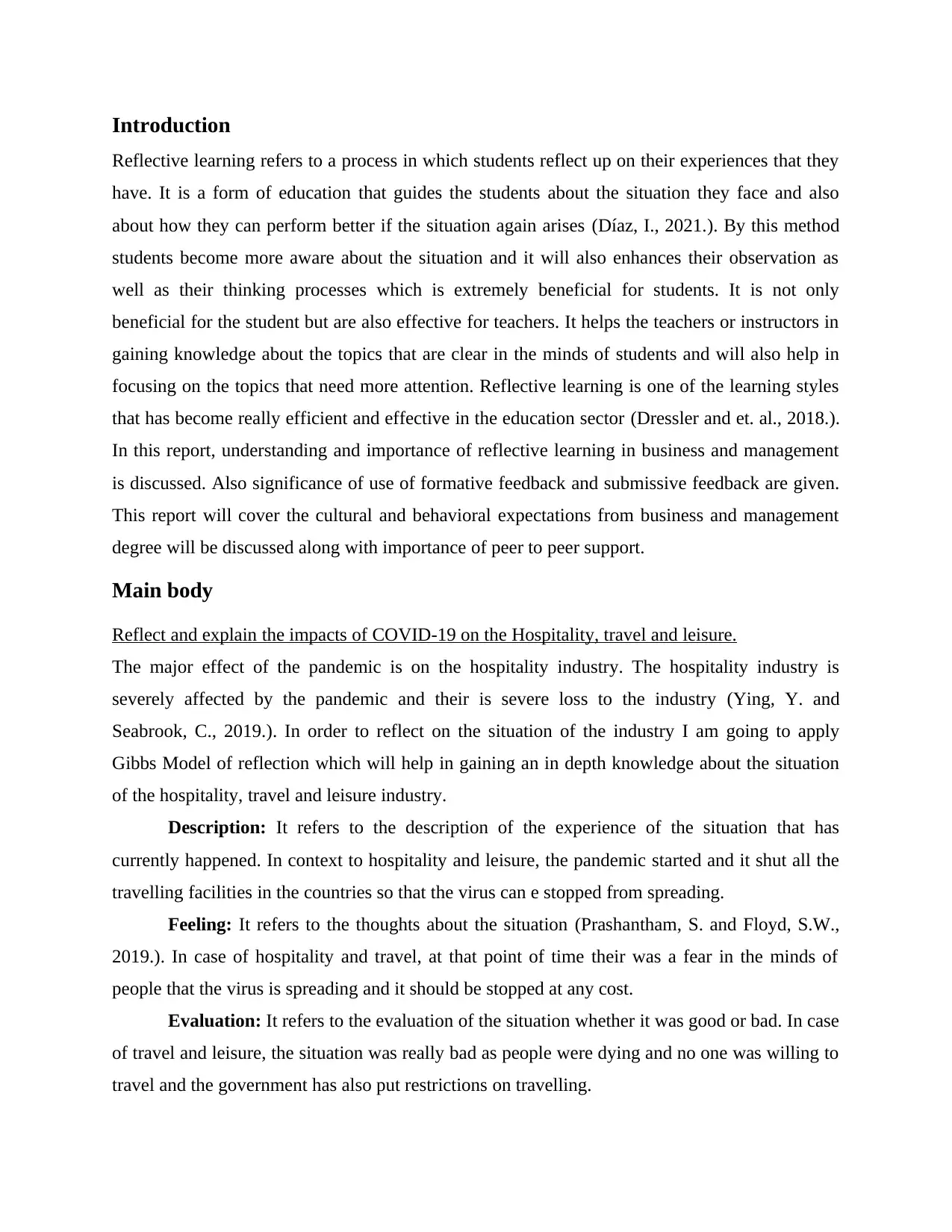
Introduction
Reflective learning refers to a process in which students reflect up on their experiences that they
have. It is a form of education that guides the students about the situation they face and also
about how they can perform better if the situation again arises (Díaz, I., 2021.). By this method
students become more aware about the situation and it will also enhances their observation as
well as their thinking processes which is extremely beneficial for students. It is not only
beneficial for the student but are also effective for teachers. It helps the teachers or instructors in
gaining knowledge about the topics that are clear in the minds of students and will also help in
focusing on the topics that need more attention. Reflective learning is one of the learning styles
that has become really efficient and effective in the education sector (Dressler and et. al., 2018.).
In this report, understanding and importance of reflective learning in business and management
is discussed. Also significance of use of formative feedback and submissive feedback are given.
This report will cover the cultural and behavioral expectations from business and management
degree will be discussed along with importance of peer to peer support.
Main body
Reflect and explain the impacts of COVID-19 on the Hospitality, travel and leisure.
The major effect of the pandemic is on the hospitality industry. The hospitality industry is
severely affected by the pandemic and their is severe loss to the industry (Ying, Y. and
Seabrook, C., 2019.). In order to reflect on the situation of the industry I am going to apply
Gibbs Model of reflection which will help in gaining an in depth knowledge about the situation
of the hospitality, travel and leisure industry.
Description: It refers to the description of the experience of the situation that has
currently happened. In context to hospitality and leisure, the pandemic started and it shut all the
travelling facilities in the countries so that the virus can e stopped from spreading.
Feeling: It refers to the thoughts about the situation (Prashantham, S. and Floyd, S.W.,
2019.). In case of hospitality and travel, at that point of time their was a fear in the minds of
people that the virus is spreading and it should be stopped at any cost.
Evaluation: It refers to the evaluation of the situation whether it was good or bad. In case
of travel and leisure, the situation was really bad as people were dying and no one was willing to
travel and the government has also put restrictions on travelling.
Reflective learning refers to a process in which students reflect up on their experiences that they
have. It is a form of education that guides the students about the situation they face and also
about how they can perform better if the situation again arises (Díaz, I., 2021.). By this method
students become more aware about the situation and it will also enhances their observation as
well as their thinking processes which is extremely beneficial for students. It is not only
beneficial for the student but are also effective for teachers. It helps the teachers or instructors in
gaining knowledge about the topics that are clear in the minds of students and will also help in
focusing on the topics that need more attention. Reflective learning is one of the learning styles
that has become really efficient and effective in the education sector (Dressler and et. al., 2018.).
In this report, understanding and importance of reflective learning in business and management
is discussed. Also significance of use of formative feedback and submissive feedback are given.
This report will cover the cultural and behavioral expectations from business and management
degree will be discussed along with importance of peer to peer support.
Main body
Reflect and explain the impacts of COVID-19 on the Hospitality, travel and leisure.
The major effect of the pandemic is on the hospitality industry. The hospitality industry is
severely affected by the pandemic and their is severe loss to the industry (Ying, Y. and
Seabrook, C., 2019.). In order to reflect on the situation of the industry I am going to apply
Gibbs Model of reflection which will help in gaining an in depth knowledge about the situation
of the hospitality, travel and leisure industry.
Description: It refers to the description of the experience of the situation that has
currently happened. In context to hospitality and leisure, the pandemic started and it shut all the
travelling facilities in the countries so that the virus can e stopped from spreading.
Feeling: It refers to the thoughts about the situation (Prashantham, S. and Floyd, S.W.,
2019.). In case of hospitality and travel, at that point of time their was a fear in the minds of
people that the virus is spreading and it should be stopped at any cost.
Evaluation: It refers to the evaluation of the situation whether it was good or bad. In case
of travel and leisure, the situation was really bad as people were dying and no one was willing to
travel and the government has also put restrictions on travelling.
⊘ This is a preview!⊘
Do you want full access?
Subscribe today to unlock all pages.

Trusted by 1+ million students worldwide
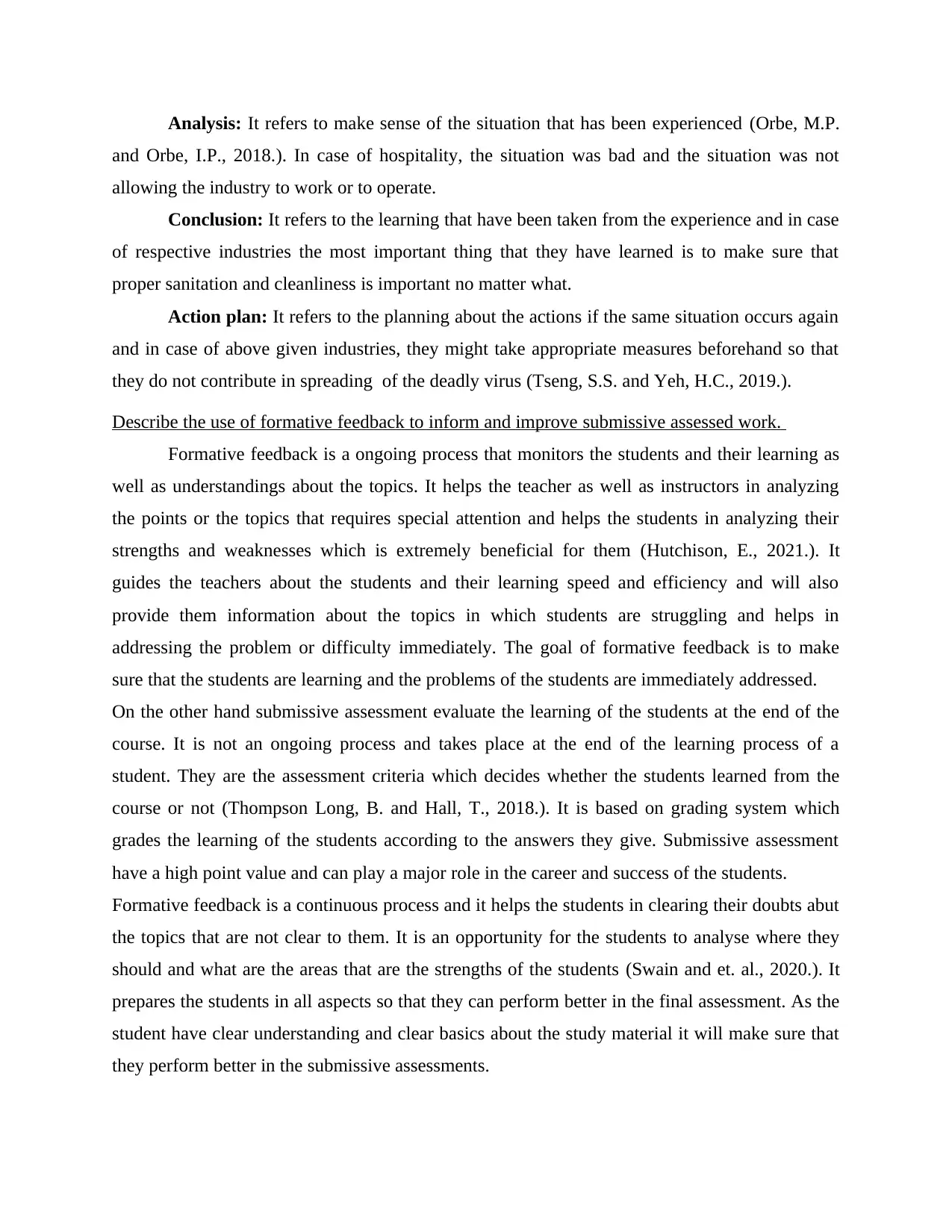
Analysis: It refers to make sense of the situation that has been experienced (Orbe, M.P.
and Orbe, I.P., 2018.). In case of hospitality, the situation was bad and the situation was not
allowing the industry to work or to operate.
Conclusion: It refers to the learning that have been taken from the experience and in case
of respective industries the most important thing that they have learned is to make sure that
proper sanitation and cleanliness is important no matter what.
Action plan: It refers to the planning about the actions if the same situation occurs again
and in case of above given industries, they might take appropriate measures beforehand so that
they do not contribute in spreading of the deadly virus (Tseng, S.S. and Yeh, H.C., 2019.).
Describe the use of formative feedback to inform and improve submissive assessed work.
Formative feedback is a ongoing process that monitors the students and their learning as
well as understandings about the topics. It helps the teacher as well as instructors in analyzing
the points or the topics that requires special attention and helps the students in analyzing their
strengths and weaknesses which is extremely beneficial for them (Hutchison, E., 2021.). It
guides the teachers about the students and their learning speed and efficiency and will also
provide them information about the topics in which students are struggling and helps in
addressing the problem or difficulty immediately. The goal of formative feedback is to make
sure that the students are learning and the problems of the students are immediately addressed.
On the other hand submissive assessment evaluate the learning of the students at the end of the
course. It is not an ongoing process and takes place at the end of the learning process of a
student. They are the assessment criteria which decides whether the students learned from the
course or not (Thompson Long, B. and Hall, T., 2018.). It is based on grading system which
grades the learning of the students according to the answers they give. Submissive assessment
have a high point value and can play a major role in the career and success of the students.
Formative feedback is a continuous process and it helps the students in clearing their doubts abut
the topics that are not clear to them. It is an opportunity for the students to analyse where they
should and what are the areas that are the strengths of the students (Swain and et. al., 2020.). It
prepares the students in all aspects so that they can perform better in the final assessment. As the
student have clear understanding and clear basics about the study material it will make sure that
they perform better in the submissive assessments.
and Orbe, I.P., 2018.). In case of hospitality, the situation was bad and the situation was not
allowing the industry to work or to operate.
Conclusion: It refers to the learning that have been taken from the experience and in case
of respective industries the most important thing that they have learned is to make sure that
proper sanitation and cleanliness is important no matter what.
Action plan: It refers to the planning about the actions if the same situation occurs again
and in case of above given industries, they might take appropriate measures beforehand so that
they do not contribute in spreading of the deadly virus (Tseng, S.S. and Yeh, H.C., 2019.).
Describe the use of formative feedback to inform and improve submissive assessed work.
Formative feedback is a ongoing process that monitors the students and their learning as
well as understandings about the topics. It helps the teacher as well as instructors in analyzing
the points or the topics that requires special attention and helps the students in analyzing their
strengths and weaknesses which is extremely beneficial for them (Hutchison, E., 2021.). It
guides the teachers about the students and their learning speed and efficiency and will also
provide them information about the topics in which students are struggling and helps in
addressing the problem or difficulty immediately. The goal of formative feedback is to make
sure that the students are learning and the problems of the students are immediately addressed.
On the other hand submissive assessment evaluate the learning of the students at the end of the
course. It is not an ongoing process and takes place at the end of the learning process of a
student. They are the assessment criteria which decides whether the students learned from the
course or not (Thompson Long, B. and Hall, T., 2018.). It is based on grading system which
grades the learning of the students according to the answers they give. Submissive assessment
have a high point value and can play a major role in the career and success of the students.
Formative feedback is a continuous process and it helps the students in clearing their doubts abut
the topics that are not clear to them. It is an opportunity for the students to analyse where they
should and what are the areas that are the strengths of the students (Swain and et. al., 2020.). It
prepares the students in all aspects so that they can perform better in the final assessment. As the
student have clear understanding and clear basics about the study material it will make sure that
they perform better in the submissive assessments.
Paraphrase This Document
Need a fresh take? Get an instant paraphrase of this document with our AI Paraphraser
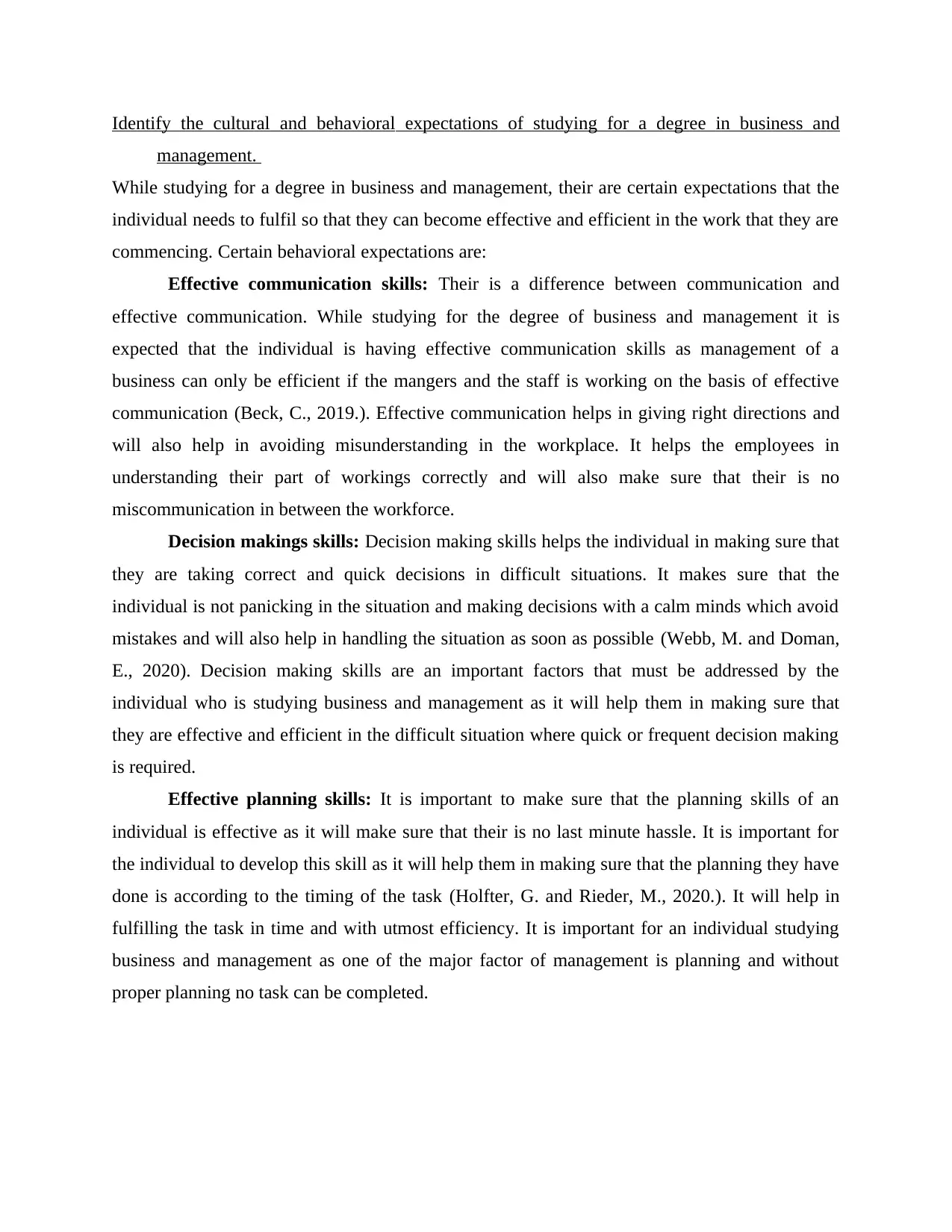
Identify the cultural and behavioral expectations of studying for a degree in business and
management.
While studying for a degree in business and management, their are certain expectations that the
individual needs to fulfil so that they can become effective and efficient in the work that they are
commencing. Certain behavioral expectations are:
Effective communication skills: Their is a difference between communication and
effective communication. While studying for the degree of business and management it is
expected that the individual is having effective communication skills as management of a
business can only be efficient if the mangers and the staff is working on the basis of effective
communication (Beck, C., 2019.). Effective communication helps in giving right directions and
will also help in avoiding misunderstanding in the workplace. It helps the employees in
understanding their part of workings correctly and will also make sure that their is no
miscommunication in between the workforce.
Decision makings skills: Decision making skills helps the individual in making sure that
they are taking correct and quick decisions in difficult situations. It makes sure that the
individual is not panicking in the situation and making decisions with a calm minds which avoid
mistakes and will also help in handling the situation as soon as possible (Webb, M. and Doman,
E., 2020). Decision making skills are an important factors that must be addressed by the
individual who is studying business and management as it will help them in making sure that
they are effective and efficient in the difficult situation where quick or frequent decision making
is required.
Effective planning skills: It is important to make sure that the planning skills of an
individual is effective as it will make sure that their is no last minute hassle. It is important for
the individual to develop this skill as it will help them in making sure that the planning they have
done is according to the timing of the task (Holfter, G. and Rieder, M., 2020.). It will help in
fulfilling the task in time and with utmost efficiency. It is important for an individual studying
business and management as one of the major factor of management is planning and without
proper planning no task can be completed.
management.
While studying for a degree in business and management, their are certain expectations that the
individual needs to fulfil so that they can become effective and efficient in the work that they are
commencing. Certain behavioral expectations are:
Effective communication skills: Their is a difference between communication and
effective communication. While studying for the degree of business and management it is
expected that the individual is having effective communication skills as management of a
business can only be efficient if the mangers and the staff is working on the basis of effective
communication (Beck, C., 2019.). Effective communication helps in giving right directions and
will also help in avoiding misunderstanding in the workplace. It helps the employees in
understanding their part of workings correctly and will also make sure that their is no
miscommunication in between the workforce.
Decision makings skills: Decision making skills helps the individual in making sure that
they are taking correct and quick decisions in difficult situations. It makes sure that the
individual is not panicking in the situation and making decisions with a calm minds which avoid
mistakes and will also help in handling the situation as soon as possible (Webb, M. and Doman,
E., 2020). Decision making skills are an important factors that must be addressed by the
individual who is studying business and management as it will help them in making sure that
they are effective and efficient in the difficult situation where quick or frequent decision making
is required.
Effective planning skills: It is important to make sure that the planning skills of an
individual is effective as it will make sure that their is no last minute hassle. It is important for
the individual to develop this skill as it will help them in making sure that the planning they have
done is according to the timing of the task (Holfter, G. and Rieder, M., 2020.). It will help in
fulfilling the task in time and with utmost efficiency. It is important for an individual studying
business and management as one of the major factor of management is planning and without
proper planning no task can be completed.
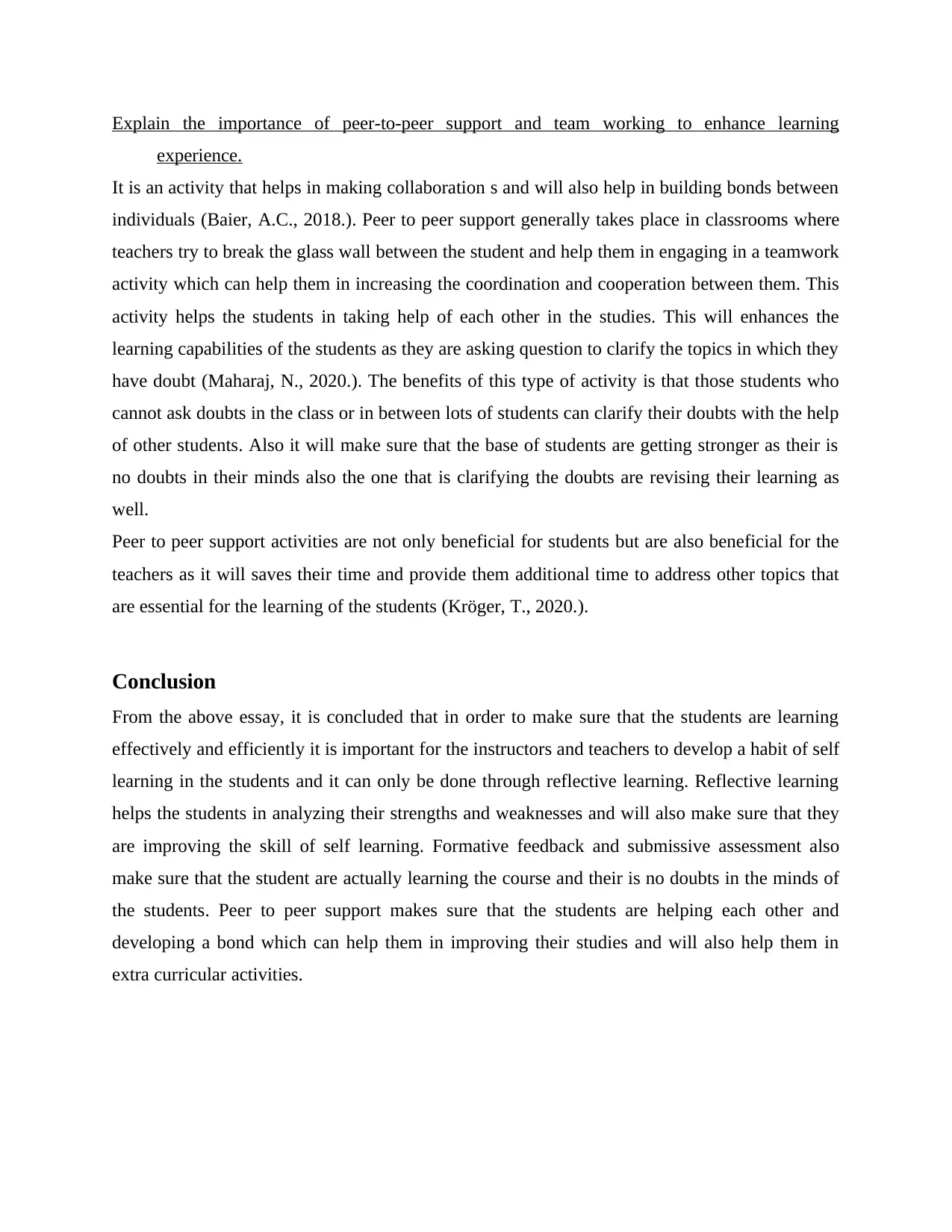
Explain the importance of peer-to-peer support and team working to enhance learning
experience.
It is an activity that helps in making collaboration s and will also help in building bonds between
individuals (Baier, A.C., 2018.). Peer to peer support generally takes place in classrooms where
teachers try to break the glass wall between the student and help them in engaging in a teamwork
activity which can help them in increasing the coordination and cooperation between them. This
activity helps the students in taking help of each other in the studies. This will enhances the
learning capabilities of the students as they are asking question to clarify the topics in which they
have doubt (Maharaj, N., 2020.). The benefits of this type of activity is that those students who
cannot ask doubts in the class or in between lots of students can clarify their doubts with the help
of other students. Also it will make sure that the base of students are getting stronger as their is
no doubts in their minds also the one that is clarifying the doubts are revising their learning as
well.
Peer to peer support activities are not only beneficial for students but are also beneficial for the
teachers as it will saves their time and provide them additional time to address other topics that
are essential for the learning of the students (Kröger, T., 2020.).
Conclusion
From the above essay, it is concluded that in order to make sure that the students are learning
effectively and efficiently it is important for the instructors and teachers to develop a habit of self
learning in the students and it can only be done through reflective learning. Reflective learning
helps the students in analyzing their strengths and weaknesses and will also make sure that they
are improving the skill of self learning. Formative feedback and submissive assessment also
make sure that the student are actually learning the course and their is no doubts in the minds of
the students. Peer to peer support makes sure that the students are helping each other and
developing a bond which can help them in improving their studies and will also help them in
extra curricular activities.
experience.
It is an activity that helps in making collaboration s and will also help in building bonds between
individuals (Baier, A.C., 2018.). Peer to peer support generally takes place in classrooms where
teachers try to break the glass wall between the student and help them in engaging in a teamwork
activity which can help them in increasing the coordination and cooperation between them. This
activity helps the students in taking help of each other in the studies. This will enhances the
learning capabilities of the students as they are asking question to clarify the topics in which they
have doubt (Maharaj, N., 2020.). The benefits of this type of activity is that those students who
cannot ask doubts in the class or in between lots of students can clarify their doubts with the help
of other students. Also it will make sure that the base of students are getting stronger as their is
no doubts in their minds also the one that is clarifying the doubts are revising their learning as
well.
Peer to peer support activities are not only beneficial for students but are also beneficial for the
teachers as it will saves their time and provide them additional time to address other topics that
are essential for the learning of the students (Kröger, T., 2020.).
Conclusion
From the above essay, it is concluded that in order to make sure that the students are learning
effectively and efficiently it is important for the instructors and teachers to develop a habit of self
learning in the students and it can only be done through reflective learning. Reflective learning
helps the students in analyzing their strengths and weaknesses and will also make sure that they
are improving the skill of self learning. Formative feedback and submissive assessment also
make sure that the student are actually learning the course and their is no doubts in the minds of
the students. Peer to peer support makes sure that the students are helping each other and
developing a bond which can help them in improving their studies and will also help them in
extra curricular activities.
⊘ This is a preview!⊘
Do you want full access?
Subscribe today to unlock all pages.

Trusted by 1+ million students worldwide
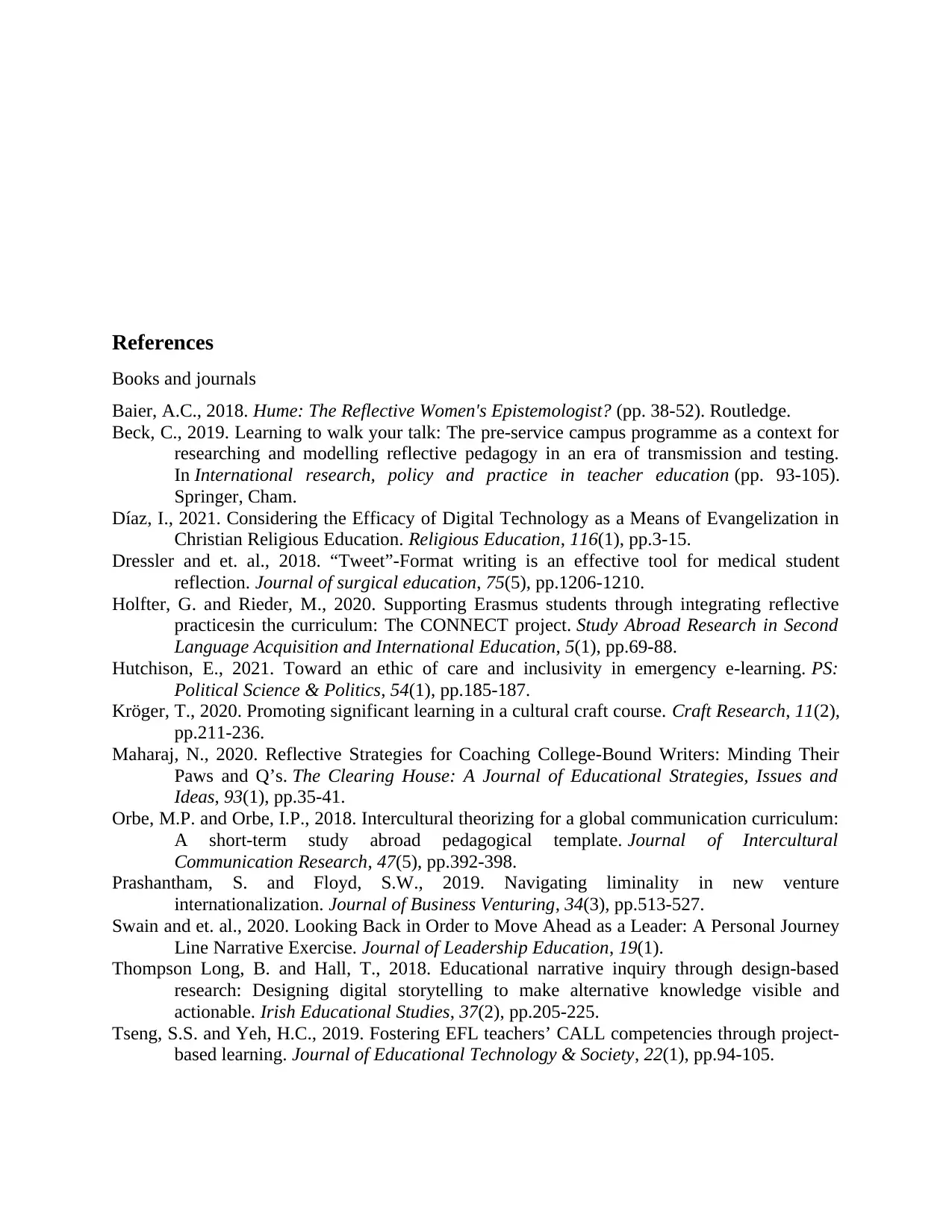
References
Books and journals
Baier, A.C., 2018. Hume: The Reflective Women's Epistemologist? (pp. 38-52). Routledge.
Beck, C., 2019. Learning to walk your talk: The pre-service campus programme as a context for
researching and modelling reflective pedagogy in an era of transmission and testing.
In International research, policy and practice in teacher education (pp. 93-105).
Springer, Cham.
Díaz, I., 2021. Considering the Efficacy of Digital Technology as a Means of Evangelization in
Christian Religious Education. Religious Education, 116(1), pp.3-15.
Dressler and et. al., 2018. “Tweet”-Format writing is an effective tool for medical student
reflection. Journal of surgical education, 75(5), pp.1206-1210.
Holfter, G. and Rieder, M., 2020. Supporting Erasmus students through integrating reflective
practicesin the curriculum: The CONNECT project. Study Abroad Research in Second
Language Acquisition and International Education, 5(1), pp.69-88.
Hutchison, E., 2021. Toward an ethic of care and inclusivity in emergency e-learning. PS:
Political Science & Politics, 54(1), pp.185-187.
Kröger, T., 2020. Promoting significant learning in a cultural craft course. Craft Research, 11(2),
pp.211-236.
Maharaj, N., 2020. Reflective Strategies for Coaching College-Bound Writers: Minding Their
Paws and Q’s. The Clearing House: A Journal of Educational Strategies, Issues and
Ideas, 93(1), pp.35-41.
Orbe, M.P. and Orbe, I.P., 2018. Intercultural theorizing for a global communication curriculum:
A short-term study abroad pedagogical template. Journal of Intercultural
Communication Research, 47(5), pp.392-398.
Prashantham, S. and Floyd, S.W., 2019. Navigating liminality in new venture
internationalization. Journal of Business Venturing, 34(3), pp.513-527.
Swain and et. al., 2020. Looking Back in Order to Move Ahead as a Leader: A Personal Journey
Line Narrative Exercise. Journal of Leadership Education, 19(1).
Thompson Long, B. and Hall, T., 2018. Educational narrative inquiry through design-based
research: Designing digital storytelling to make alternative knowledge visible and
actionable. Irish Educational Studies, 37(2), pp.205-225.
Tseng, S.S. and Yeh, H.C., 2019. Fostering EFL teachers’ CALL competencies through project-
based learning. Journal of Educational Technology & Society, 22(1), pp.94-105.
Books and journals
Baier, A.C., 2018. Hume: The Reflective Women's Epistemologist? (pp. 38-52). Routledge.
Beck, C., 2019. Learning to walk your talk: The pre-service campus programme as a context for
researching and modelling reflective pedagogy in an era of transmission and testing.
In International research, policy and practice in teacher education (pp. 93-105).
Springer, Cham.
Díaz, I., 2021. Considering the Efficacy of Digital Technology as a Means of Evangelization in
Christian Religious Education. Religious Education, 116(1), pp.3-15.
Dressler and et. al., 2018. “Tweet”-Format writing is an effective tool for medical student
reflection. Journal of surgical education, 75(5), pp.1206-1210.
Holfter, G. and Rieder, M., 2020. Supporting Erasmus students through integrating reflective
practicesin the curriculum: The CONNECT project. Study Abroad Research in Second
Language Acquisition and International Education, 5(1), pp.69-88.
Hutchison, E., 2021. Toward an ethic of care and inclusivity in emergency e-learning. PS:
Political Science & Politics, 54(1), pp.185-187.
Kröger, T., 2020. Promoting significant learning in a cultural craft course. Craft Research, 11(2),
pp.211-236.
Maharaj, N., 2020. Reflective Strategies for Coaching College-Bound Writers: Minding Their
Paws and Q’s. The Clearing House: A Journal of Educational Strategies, Issues and
Ideas, 93(1), pp.35-41.
Orbe, M.P. and Orbe, I.P., 2018. Intercultural theorizing for a global communication curriculum:
A short-term study abroad pedagogical template. Journal of Intercultural
Communication Research, 47(5), pp.392-398.
Prashantham, S. and Floyd, S.W., 2019. Navigating liminality in new venture
internationalization. Journal of Business Venturing, 34(3), pp.513-527.
Swain and et. al., 2020. Looking Back in Order to Move Ahead as a Leader: A Personal Journey
Line Narrative Exercise. Journal of Leadership Education, 19(1).
Thompson Long, B. and Hall, T., 2018. Educational narrative inquiry through design-based
research: Designing digital storytelling to make alternative knowledge visible and
actionable. Irish Educational Studies, 37(2), pp.205-225.
Tseng, S.S. and Yeh, H.C., 2019. Fostering EFL teachers’ CALL competencies through project-
based learning. Journal of Educational Technology & Society, 22(1), pp.94-105.
Paraphrase This Document
Need a fresh take? Get an instant paraphrase of this document with our AI Paraphraser
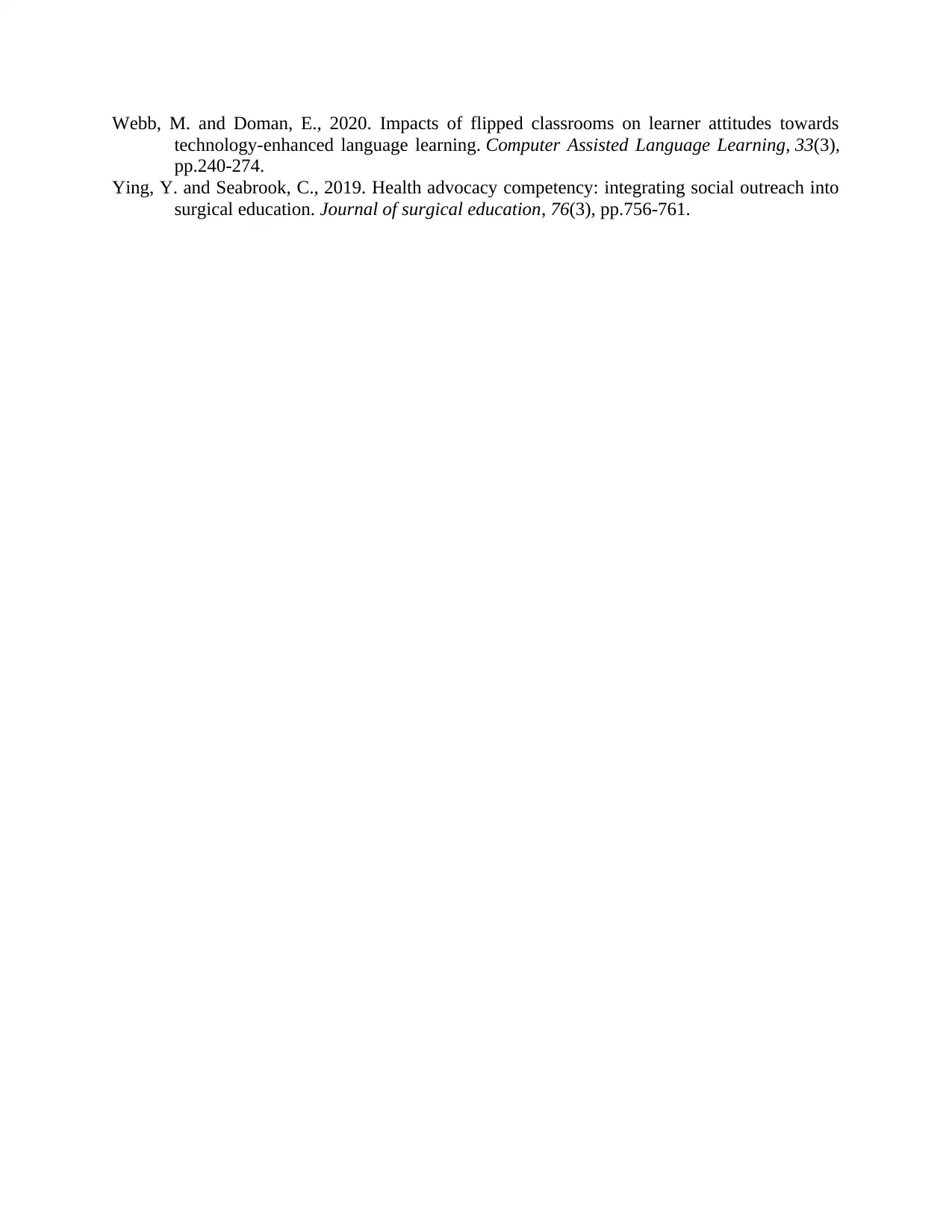
Webb, M. and Doman, E., 2020. Impacts of flipped classrooms on learner attitudes towards
technology-enhanced language learning. Computer Assisted Language Learning, 33(3),
pp.240-274.
Ying, Y. and Seabrook, C., 2019. Health advocacy competency: integrating social outreach into
surgical education. Journal of surgical education, 76(3), pp.756-761.
technology-enhanced language learning. Computer Assisted Language Learning, 33(3),
pp.240-274.
Ying, Y. and Seabrook, C., 2019. Health advocacy competency: integrating social outreach into
surgical education. Journal of surgical education, 76(3), pp.756-761.
1 out of 8
Related Documents
Your All-in-One AI-Powered Toolkit for Academic Success.
+13062052269
info@desklib.com
Available 24*7 on WhatsApp / Email
![[object Object]](/_next/static/media/star-bottom.7253800d.svg)
Unlock your academic potential
Copyright © 2020–2025 A2Z Services. All Rights Reserved. Developed and managed by ZUCOL.





